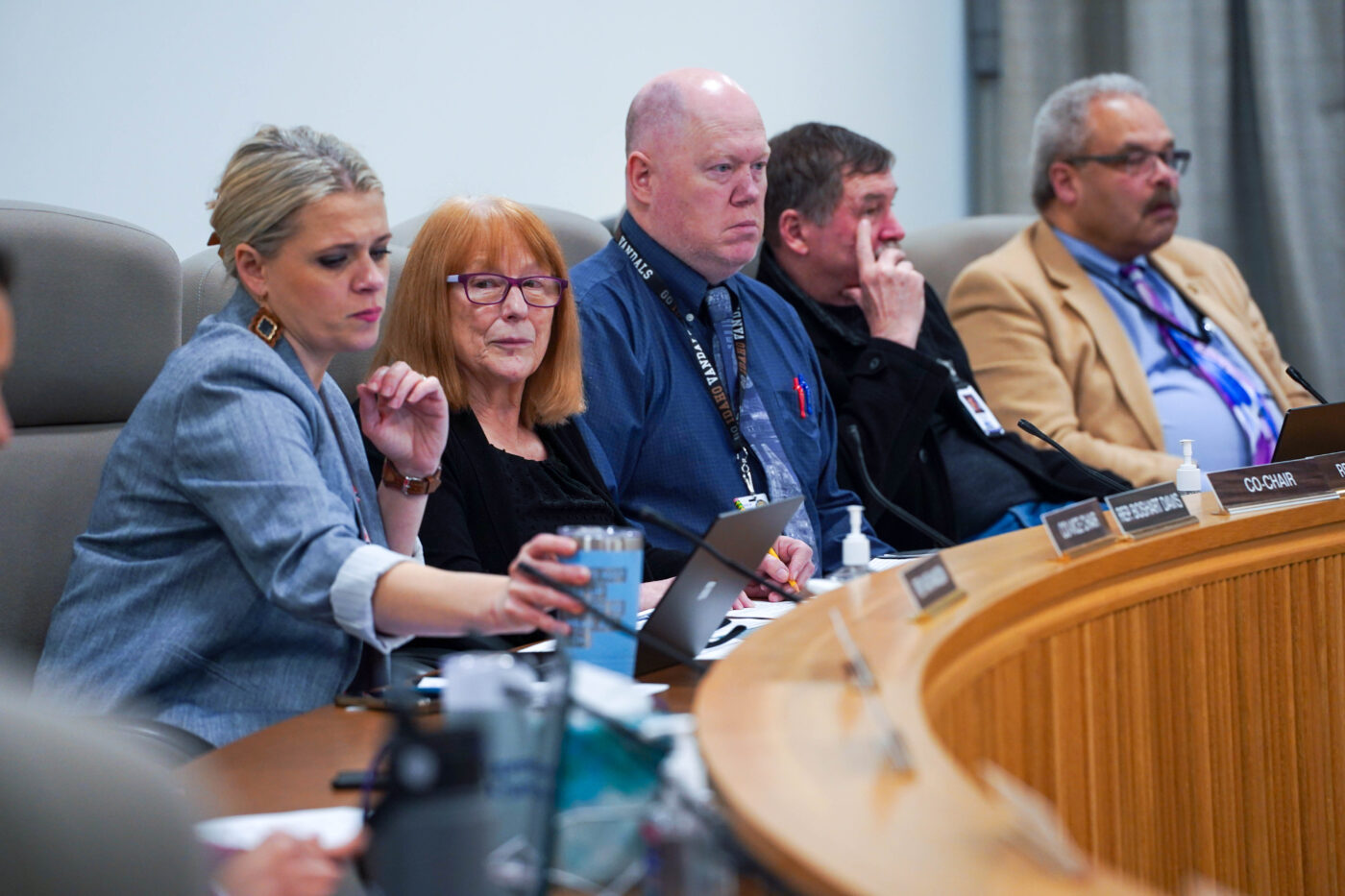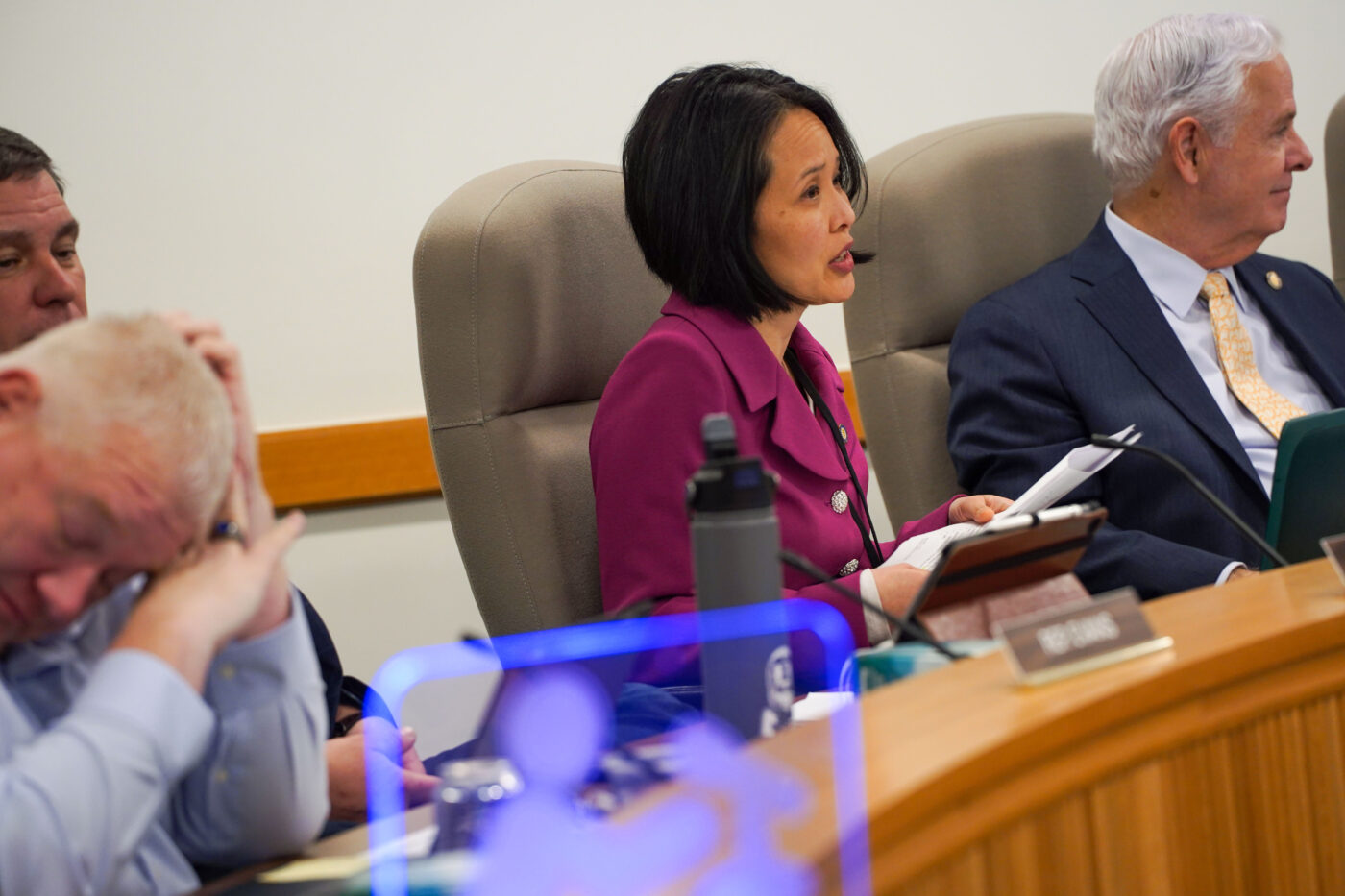
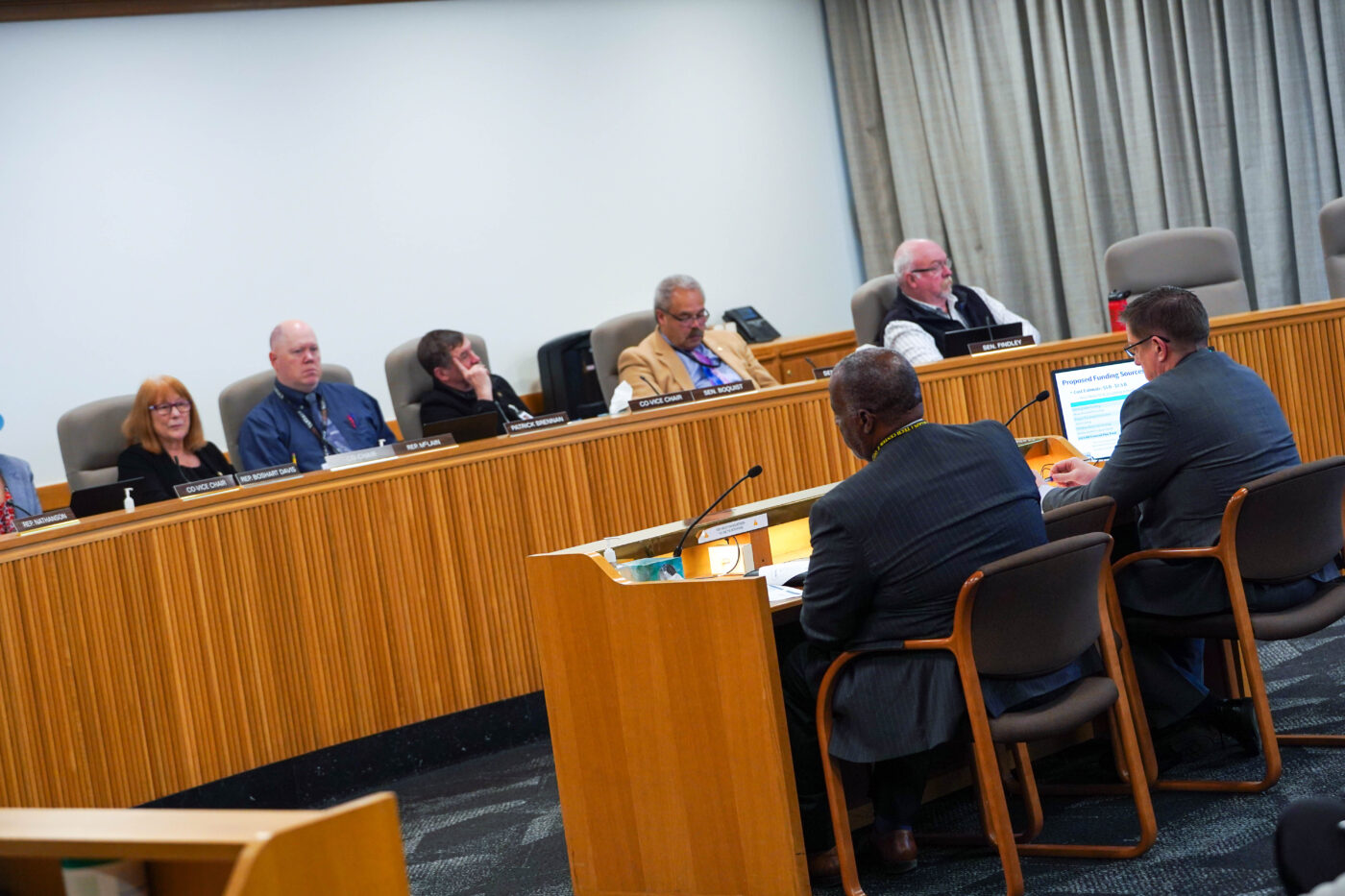
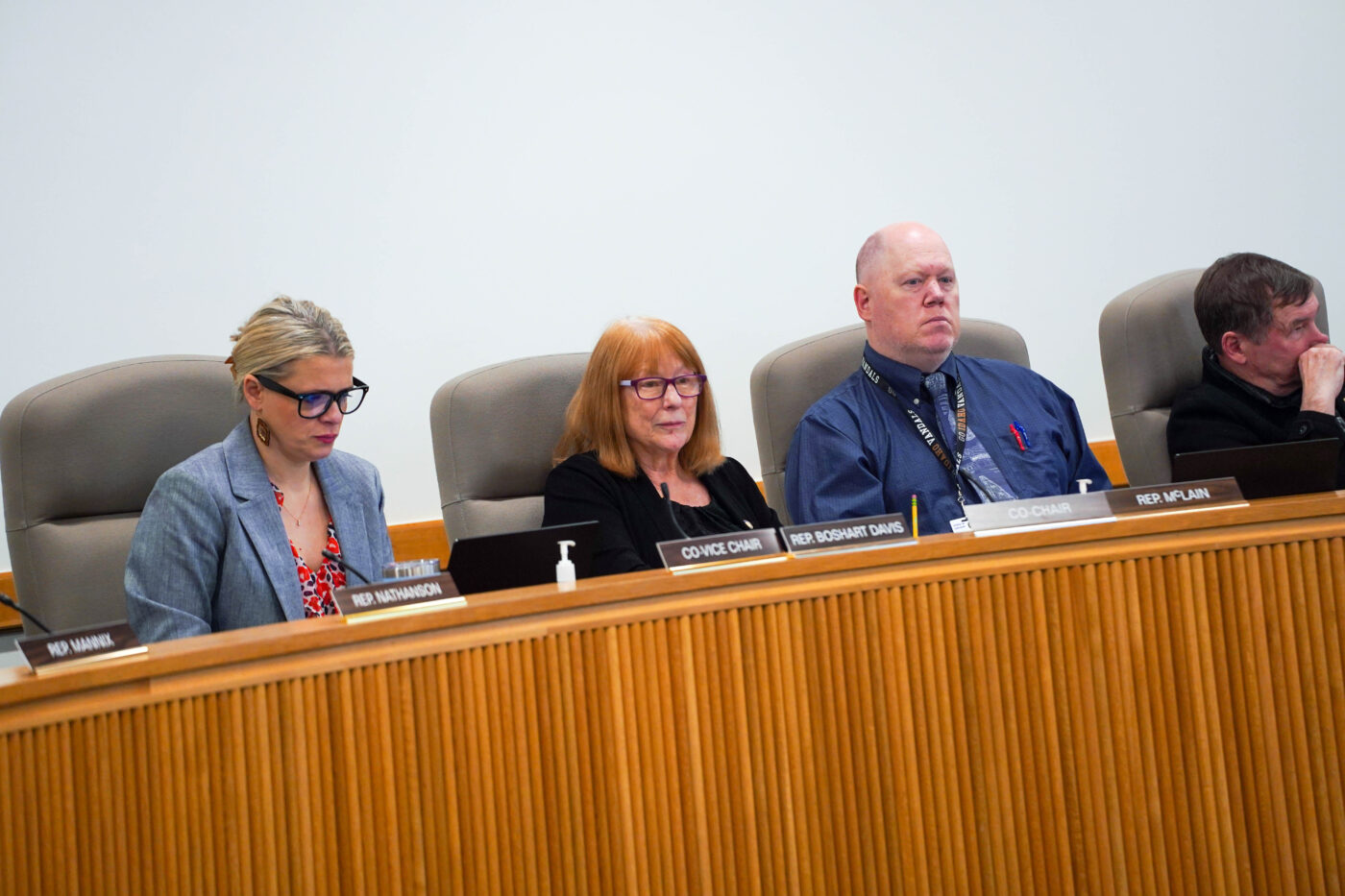
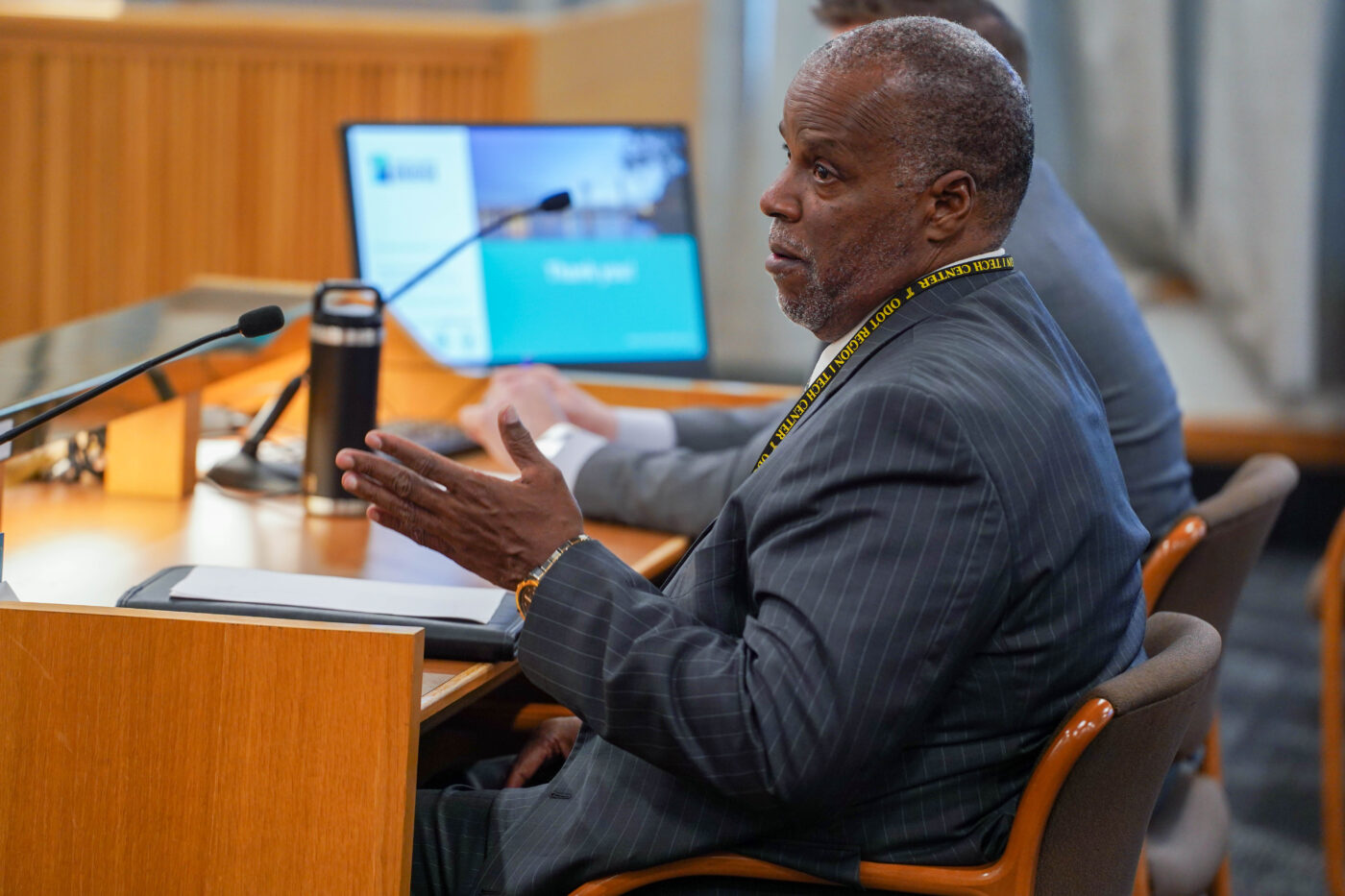
A group of five lawmakers who sit on the Joint Committee on Transportation (JCT) dropped a bombshell of a bill last week that seeks to come up with Oregon’s share of funding for the Interstate Bridge Replacement Program. That project (estimated to cost between $6 and $7.5 billion would replace the I-5 bridge between Portland and Vancouver, and build seven new interchanges with auxiliary lanes between them for a five-mile stretch of the freeway.
Everyone knew the debate over how to pay this $1 billion expense was coming since we got a preview at the end of March. But the actual bill wasn’t released until April 12th, and it just happened to get its first public airing the following day — at the tail end of a lobby day organized by the Just Crossing Alliance, a coalition of nonprofits that wants to “right-size” the project. I was at the State Capitol for that event and was able to attend the JCT’s informational session. While there wasn’t a robust debate because no public testimony was taken and JCT members only invited highly supportive panelists, we still heard the outlines of the debate to come.
Before I share a few of the meeting’s exchanges, let’s take a closer look at what’s in the bill.
The bill
HB 2098 -2 (PDF) is a classic “gut and stuff” which means it was filed months ago with a summary that said it would deal with speed bump heights and markings. That’s all been deleted and the “dash 2” amendments are what folks are talking about now.
There are several key things this bill wants to do. First, it would set a hard cap on the total price of the project at $6.3 billion. This is likely a gesture from lawmakers who want to be seen as holding ODOT accountable. When I asked a source (and ODOT critic) about why this was in the bill, they grinned and said, “What happens if they go over it? There’s no way to enforce it.”
The main meat of the bill is in Section 3 (page four, line nine) where it says the legislature will, “support the Interstate 5 bridge replacement project through an investment of $1 billion, financed through the issuance of general obligation bonds over the next four biennia and repaid with General Fund obligations.” It’s notable that when JCT members revealed their $1 billion plan at the end of March they asked to use only $300 million from GO bonds.
And then the bill starts to creep…
On page seven, line 16 there’s a section that would force the legislature to “fully fund” the I-5 Rose Quarter project in the next two sessions. The section also seeks to give I-5 Rose Quarter project a pat on the head by re-stating that it, “remains a priority project of statewide significance.” It’s unclear why JCT members threw this in, but the controversy and deep skepticism surrounding that project and the increasing desperation from ODOT to fund it (and several other freeway expansions in the region) likely has something to do with it.
Tolls will be a part of this project. In a section on cost analysis, the bill requires the legislature to “evaluate the amount that users of each class of vehicle actually paid for the cost of maintenance, operation and improvement of highways, roads and streets in the state; and whether the amount paid was a proportionate share of those costs.” This passage has some concerned that lawmakers want to be able to consider the possibility of tolling bike riders, electric car drivers, and so on.
Relatedly, also in the bill is new reporting that would be required as part of a “Highway Cost Allocation Study.” This study would seek to determine, “The proportionate share that the users of each class of vehicle should pay for the costs of maintenance, operation and improvement of the highways, roads and streets in the state; and whether the users of each class are paying that share.”
This morning at a Metro advisory committee meeting, the director of ODOT’s Urban Mobility Office, Brendan Finn, pointed out that the bicycle and pedestrian components of the IBR project cost about $100 million. If you pass a bill that defines a bicycle path as a “tollway” and then you have a study that says bicycle users are not paying their share of that $100 million, who knows what kind of policy conclusions lawmakers might come to.
Remember, several leaders of the JCT were the folks at the table when Oregon passed the $15 excise tax on the purchase of new bicycles.
The politics
Less than 24 hours after its first meeting at the JCT, Governor Tina Kotek threw cold water on the entire bill. According to the Capitol Chronicle, “She balked at the proposed source of those funds.”
It’s totally reasonable that the idea of using General Fund monies to pay for transportation projects gives Kotek some heartburn. According to economist and staunch ODOT critic Joe Cortright, HB 2098 is the first time in Oregon state history that would ever been done (I told you they are desperate). The state typically uses only the State Highway Fund to pay for road projects. “This would be a massive break from that philosophy,” Cortright wrote Tuesday. “It’s really hard to understand why Oregon taxpayers should take money that could be used to educate children, care for the sick, or address homelessness, and use it to subsidize commuters (and shoppers) from another state.”
At the JCT meeting last Thursday, House Representative Khanh Pham (D-Portland) expressed strong concerns about how the bill goes beyond just funding the IBR project. “I don’t quite understand why we’re bundling language about studies on tolling, funding the Rose Quarter — there’s even language about potentially tolling bicycle paths and singling out electric vehicles for special fees statewide…. I’m concerned,” she said.
Senator Lynn Findley, a Republic who represents eastern Oregon, reminded IBR Administrator Greg Johnson that he’s not comfortable with the fact that the legislature hasn’t voted to support funding this project. “We have to be very careful how we say [we got unanimous support from local officials for the project], none of this panel has voted for this bridge. There’s a difference between a local elected official saying ‘Yeah we love the bridge and this is the option we want,’ and not writing a check. And then the state people saying, ‘Yeah, we like the bridge and we’re going to write you a check.'”
Rep Pham also pressed Johnson for details about how wide the bridge would be and she questioned ODOT’s track record of using only 30% unionized labor on their construction projects.
The JCT is set to continue their debate on this bill at their meeting today. And this time they’ve invited a more diverse panel of voices that aren’t as likely to sing the project’s praises. Stay tuned for more coverage.
In related news, Senator Lew Frederick (D-Portland) has been named as a Joint Committee on Transportation co-chair. Sen. Frederick is taking the place of Sen. Chris Gorsek (D-Troutdale) who is away from the legislature due to a medical issue. I-5 runs through Sen. Frederick’s north Portland district.
UPDATE, 4/21: A public hearing for this bill has been set. It will be 4/27 at the JCT. Details here.
